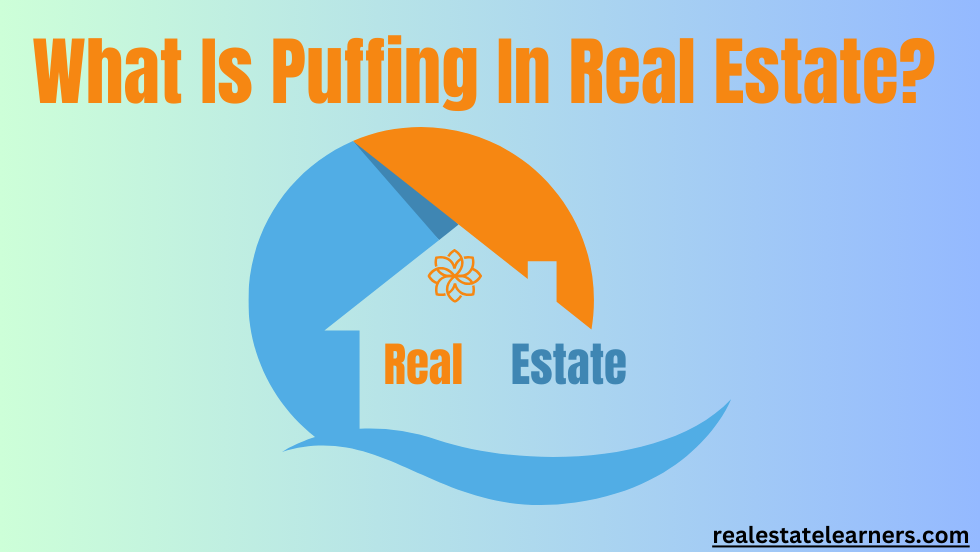The real estate industry is a highly competitive market, where agents and brokers often use persuasive techniques to attract potential buyers. One of the most common tactics used in this field is puffing. As an aspiring and real estate agent or buyer, you should be aware of the various techniques used in this industry to make informed decisions. In this post, we will look about puffing real estate and its implications.
What is puffing in real estate?
Puffing in real estate refers to exaggerating or overstating a property’s features and benefits to make it seem more desirable and attractive to potential buyers or renters. This can be done by either the seller or their agent and is often used as a marketing tactic to increase interest and potentially drive up the price.
Puffing is not necessarily illegal as long as the statements made are considered opinions rather than factual claims. However, it can easily cross the line into misrepresentation or fraud if the statements made are knowingly false or misleading.
What are the Consequences of Puffing?
While puffing may seem harmless on the surface, it can have negative consequences for buyers and sellers. For buyers, falling for exaggerated claims about a property could lead to disappointment or even financial loss if they purchase a property that does not live up to expectations. On the other hand, sellers who engage in puffing may face legal consequences if their statements are proven to be false or misleading.
What’s an example of puffing?
Some common examples of puffing in real estate include claiming a property has “million-dollar views” or exaggerating the potential for rental income. Using buzzwords or phrases such as “luxury” or “one-of-a-kind” to describe a property can also be considered puffing.
A real-life example of puffery in the real estate industry could be a seller or agent claiming that a property is “the best deal on the market” or “a once-in-a-lifetime opportunity.” These statements may not necessarily be backed up by factual evidence but are used to create a sense of urgency and desirability for the property.
Another example could be touting a property as being in a “highly sought after” or “up-and-coming” neighborhood, even if no evidence supports these claims. This puffing type can mislead buyers into thinking they are getting a better deal than they are.
How to avoid falling for puffing?
Do your own research: When considering a property, it’s essential to do your own research and not solely rely on the seller’s or agent’s claims. Look into the neighborhood, comparable properties in the area, and any other relevant information to get a full picture of the property.
Get multiple opinions: Don’t just take one person’s word for it. Talk to multiple real estate agents and get their views on the property and any potential red flags.
Ask for evidence: If a seller or agent claims a property, ask for evidence to back it up. This could be in the form of official appraisals, inspection reports, or other documentation.
Trust your instincts: If something sounds too good to be true, it probably is. Trust your instincts, and don’t let yourself be swayed by exaggerated claims.
Consult a lawyer: If you suspect puffing may be crossing the line into misrepresentation or fraud, consult a real estate lawyer for advice on how to proceed. They can assist protect your interests and ensure you are not misled.
What are the characteristics of puffery?
Subjective statements: Puffing often involves making subjective statements that cannot be proven as true or false. For example, saying a property has “unbeatable views” is a matter of opinion rather than fact.
Vague language: Puffery often uses vague or ambiguous language to make broad and exaggerated claims. This can make it difficult for buyers to determine the actual value or worth of the property.
Emotional appeal: Puffing often targets buyers’ emotions and desires in order to make a property seem more desirable. This can be done through buzzwords, flashy marketing materials, and other tactics.
No intent to deceive: While puffing may involve exaggeration, it is typically not intended to deceive or defraud buyers. Sellers and agents may genuinely believe in the statements they are making, even if they are not entirely accurate.
Common in marketing: Puffing is a commonly used tactic in various industries, including real estate, to make products or services more appealing and attractive to consumers. However, it can become problematic when it crosses over into misrepresentation or fraud.
What are the different forms of puffery?
Oral statements: Puffing can take the form of verbal statements made by sellers or their agents, such as during a property viewing or open house. These statements may not be recorded or have any written evidence to back them up.
Written advertisements: Puffing is also commonly seen in written advertisements for properties, such as listings or brochures. These may use buzzwords, superlatives, and other exaggerated language to make the property seem more desirable.
Photos and visuals: Puffing can also be done through pictures and visuals of a property, such as using filters or editing to enhance the appearance of a property. This can create a false perception of the property for potential buyers.
Online listings and reviews: With the rise of online platforms for buying and renting properties, puffing has also extended to fake or exaggerated reviews and ratings. This can mislead buyers into thinking a property is better than it actually is.
Comparative statements: Puffing may also involve making comparative statements about a property, such as claiming it is “better” or “nicer” than other properties in the area. This can create a false sense of competition and desirability for the property.
Is puffery Illegal and Unethical?
Puffery is allowed to a certain limit in the different forms of trade. Puffery may not always be illegal; it can cross over into misrepresentation or fraud if the statements are proven false or misleading. This can result in legal consequences for sellers and their agents. Additionally, puffing can also be considered unethical as it aims to manipulate buyers’ emotions and desires to make a sale.
In some cases, puffery may also lead to disappointment and dissatisfaction for buyers who were misled into purchasing a property that did not live up to the exaggerated claims made about it. This can damage trust and credibility in the real estate industry. Thus, sellers and buyers must be aware of puffery and its potential consequences.
FAQs:
Does puffing constitute misrepresentation?
No, puffing is a legal term that refers to statements made by a seller that are considered exaggerated or highly subjective. These statements do not constitute misrepresentation as they are generally expected to be opinionated and cannot be proven false. On the other hand, misrepresentation occurs when the seller makes a false statement of fact with the intention to deceive the buyer.
What is the difference between fraud and misrepresentation?
Fraud involves intentional deception for personal gain or to cause harm to another person. Misrepresentation, on the other hand, can be both intentional and unintentional. It refers to making false statements of fact that have induced someone into a contract. Fraud requires proof of intent, while misrepresentation can occur unintentionally.
What is fact vs puffery?
Fact refers to a statement based on reality that can be proven true or false. Puffery, on the other hand, is an exaggerated statement that cannot be verified. While facts are objective and can be used as evidence in court, puffery real estate is subjective and considered to be a harmless exaggeration.
Conclusion
Real estate puffing is a common practice in the real estate industry, and it can have both positive and negative effects. Despite its controversial nature, puffing continues to be used in the real estate industry, and both buyers and sellers need to understand its implications.
As a buyer, it is crucial to be aware of puffing tactics and to do your own research before making any purchasing decisions. As a seller, it is essential to use ethical sales practices and refrain from making exaggerated claims about the property.

Corey has over 15 years of experience as a real estate broker and educator. He is dedicated to providing valuable insights and guidance for those looking to enter the real estate industry.

